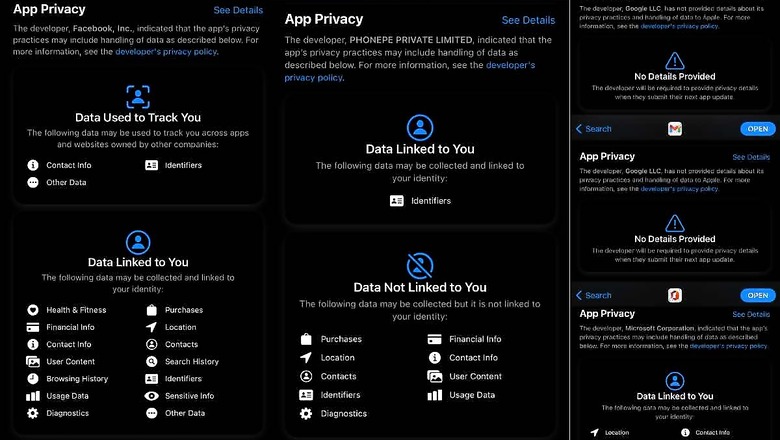
views
When Apple rolled out the iOS 14.3 update for the iPhone, the iPadOS 14.3 update for the iPad and the macOS Bug Sur 11.1 update for the Macs last week, the privacy requirements for developers who list apps on the Apple App Store were reset. The idea is to make it simpler for users to know, before the download an app, exactly what data the app will require for tracking, what data will be linked to you and what is not. These labels are mandatory for every app, and the only leeway that developers get is that they can have these labels live with the next app update they push out on the App Store. Apple has a checklist that developers need to follow when filling out the privacy labels for their apps, including the data that may be collected and used for tasks outside of just using the app—all this must be part of the disclosure to the users, before they download or update an app.
The App Store Privacy Labels will have three sections—Data used to track you, data linked to you and data that is not linked to you. Under each section will be bullet points listing the exact specifics about the data being collected, including contact info, health and fitness data, financial info, usage data, browsing history, location data, personal identifiers and search history. With this information available at a glance, a user can potentially make a more informed decision about whether they want to download a specific app on the iPhone or iPad or Mac, without falling down the data collection and privacy blackhole that became the norm over the years.
A quick browse through the listings on the Apple App Store at this time makes for what is definitely a mixed bag when it comes to the compliance a rather sad reading, in terms of compliance. A simple check out of some of the popular apps to see what they are doing reveals some of the biggest tech companies aren’t disclosing information to users, just yet.
Google and its incredibly popular apps at this time, do not comply with the new privacy labels. Gmail, Google Pay, YouTube, Photos, Chrome web browser, Google Maps and Google Search simply return “No Details Provided” in the App Privacy section in the app store listing for these apps. Amazon is another developer that has not provided the privacy label data for the Amazon shopping app or the Prime Video streaming app, for instance, at the time of writing this.
Popular apps such as Truecaller have the complete list of data available as part of the privacy labels—data used to track you, data linked to you and data not linked to you. Shopping platform Flipkart and popular digital payments app PhonePe also have the privacy labels live on their app listings on the App Store. Popular payments platform and payments bank Paytm also has the complete privacy labels available for users to check. Facebook and the Facebook owned apps, including the Facebook app, Instagram, Messenger, WhatsApp and WhatsApp for Business are also disclosing the privacy details as part of the privacy labels on the App Store. Microsoft has also updated the apps and the privacy details for their apps, including Microsoft Office, Microsoft Teams and the Microsoft Edge web browser.
Read all the Latest News, Breaking News and Coronavirus News here



















Comments
0 comment